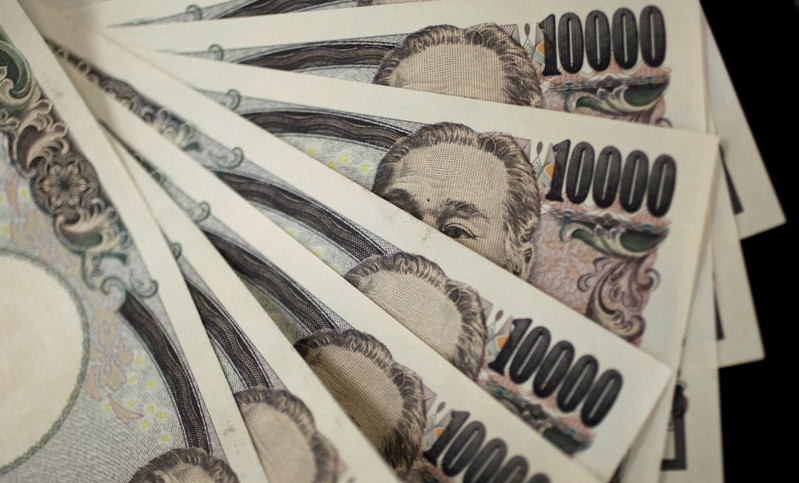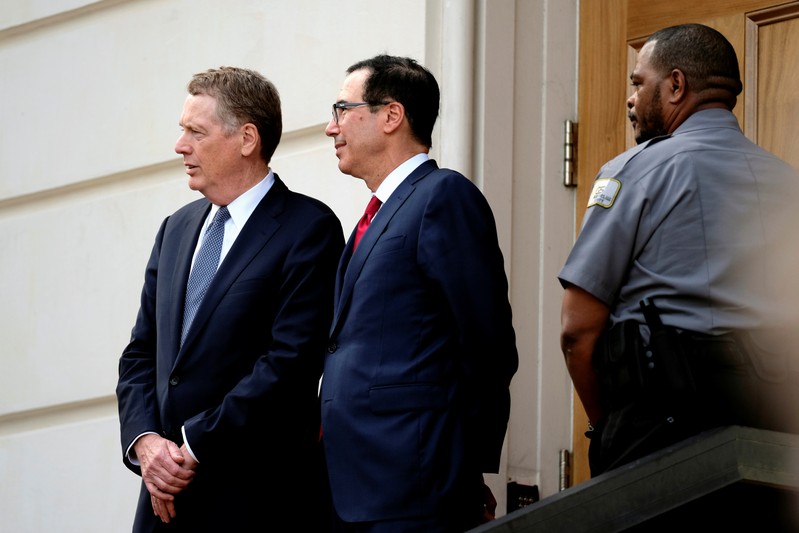
FILE PHOTO: A picture illustration shows Japanese 10,000 yen notes featuring a portrait of Yukichi Fukuzawa, the founding father of modern Japan, August 2, 2011. REUTERS/Yuriko Nakao/File Photo
May 10, 2019
By Shinichi Saoshiro
TOKYO (Reuters) – The safe-haven Japanese yen and Swiss franc dipped on Friday, handing back some of their large gains made earlier, as risk aversion eased in Asia amid the ebb and flow in market sentiment toward U.S.-China trade negotiations.
U.S. and Chinese officials began two-day talks on Thursday in a bid to avert the escalation of a trade war that threatens to derail the global economy.
The United States is poised to trigger another round of punitive tariffs at 12:01 a.m. EDT (0401 GMT) on Friday and investor focus was on how the negotiations would pan out.
On the whole acrimony between Washington and Beijing over trade issues appeared to have increased this week, but it was not all hostile talk with China appealing to meet halfway to salvage a deal.
With Asian equity markets bouncing on Friday, recovering some of the previous day’s steep losses, the dollar edged up 0.2 percent to 109.990 yen.
The U.S. currency was still down 1 percent against the yen this week, having slipped to a three-month low of 109.470 overnight.
“The dollar is clearly on a downtrend against the yen, both in terms of technicals and flows,” said Yukio Ishizuki, senior currency strategist at Daiwa Securities.
“That said, the market has been bracing for the United States triggering tariffs for a while now. There is also a fair amount of underlying dollar demand from Japanese institutional investors. Considering such factors, the dollar may not have much further room to fall.”
The greenback was a shade stronger at 1.0154 Swiss francs after dropping roughly 0.5 percent the previous day, when it touched a one-month low of 1.0122 francs.
The yen and franc tend to attract demand in times of market turmoil and political tension.
The euro added 0.2 percent to $1.1232 after touching a one-week peak of $1.1251 the day before.
The dollar index against a basket of six major currencies, of which the euro is a main component of, was little changed at 97.375.
The index had slid to 97.238 on Thursday, its lowest since May 1, as U.S. Treasury yields declined and investors shied away from risk weighed on the dollar this week.
The Australian dollar, sensitive to shifts in risk sentiment, gained 0.4 percent to $0.7013. The Aussie was still down 0.15 percent on the week, during which it brushed a four-month low of $0.6960.
(Reporting by Shinich Saoshiro; Editing by Joseph Radford and Sam Holmes)

